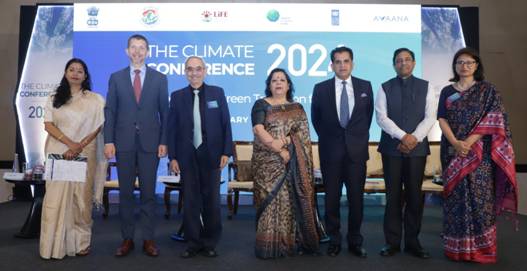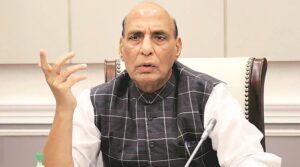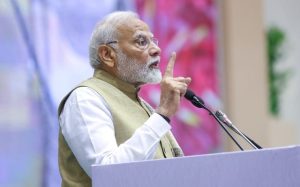New Delhi ;-
Conference a step to strengthen ongoing engagement with stakeholders
Innovation, research and climate startups needs to be expanded at scale to meet the climate commitments and all the stakeholder-be it policy makers, private sector, investors and industry and MDBs must work on innovative solutions to expand the accessibility of finance: Secretary, MoEFCC
India Stands Ready to Mobilise Capital including Through Private Capital, Blended Financing, India’s G20 Presidency Paves the Way: G20 Sherpa
The Climate Conference 2024, themed “Decoding the Green Transition for India,” took place on January 12, 2024, in Mumbai, Maharashtra. Organized by the Ministry of Environment, Forest and Climate Change, Government of India, the event focused on the pivotal role of the private sector, climate tech Startups and institutional investors in mobilizing financial resources and technical capabilities. The goal was to leverage government efforts, engage civil society and communities, and develop innovative climate services and adaptation technologies. The Conference was organised under the Green Climate Fund Readiness Programme with Delivery Partner UNDP India and supported by Knowledge Partner Avaana Capital.

Key dignitaries present at the inaugural session included Ms. Leena Nandan, Environment Secretary, Mr. Amitabh Kant, G20 Sherpa, Mr. K Rajaraman, Chairman, IFSCA, Mr. Mike Hankey, U.S. Consul General, and Mr. Nadir Godrej, Chairman & MD, Godrej Industries, and Chairman, Godrej Agrovet.
Ms. Leena Nandan, Secretary, MoEFCC, highlighted the global impact of extreme events due to climate change, emphasizing the need for immediate action, planning, and finance mobilization. She narrated the Ministry’s actions, including the Green Credits Programme. Recalling the Lifestyle for Environment (LiFE), she mentioned that the concept of ECOMARK labelling has been reinvented for informed consumer choices. Ms. Nandan stressed the importance of insurance and risk mitigation, mainstreaming climate startups, and upscaling them to industry and business models. It was emphasized that actions like biomass utilization and waste management are considerable for climate action.
Shri Amitabh Kant addressed India’s emerging issues of industrialization, urbanization, and growth, emphasizing five critical areas: renewable energy, energy storage, electric mobility, energy efficiency, and the circular economy. He highlighted the significance of promoting energy efficiency in micro, small, and medium enterprises (MSMEs) for cost savings and increased competitiveness. Shri Kant emphasized the role of MDBs, IFIs, and philanthropists in supporting high-risk climate projects and proposed a combination of public and private funds for enhanced returns and attracting substantial capital. He also highlighted the potential of green hydrogen and storage system.
The Conference underscored India’s roadmap to achieving net-zero by 2070, focusing on green transition investments to transform energy systems, reduce CO2 emissions, conserve natural resources, increase biodiversity, and enhance climate resilience in a socially just and inclusive manner. It delved into the current landscape of climate finance in India, exploring the roles of government, venture capitalists, corporates, and industry leaders. Discussions also centered on strategies to boost financing in the climate-tech ecosystem, emphasizing emerging solutions with disruptive potential.

The Conference also highlighted Sustainability linked funds, risk-sharing facilities, and concessional financing. Overall, the event brought together stakeholders from diverse sectors to foster collaboration and partnership, promoting the development and adoption of sustainable, climate-resilient technologies and practices.
****



